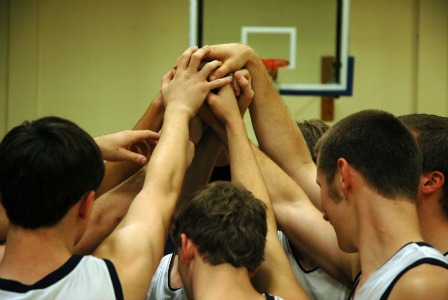
Being a teenager is tough enough, but throw some healthy competition in the mix and it's easy for your adolescent to have unsportsmanlike conduct. As parents, we can guide teens as they learn the importance of good sportsmanship.
Teaching good
sportsmanship
Whether your teenager is on the sidelines or smack dab in the middle of the game, find out how to teach your teen to be a good loser by being a good sport.
Teach teens to set reasonable expectations
Long before your teenager steps foot in the game, whether it's on the field or during family game night, you can help avoid unsportsmanlike conduct by heading it off at the source. "Your teen has to set reasonable expectations for his or her performance," explains Beverly Hills Clinical Therapist Carla Lundblade. "Some kids have low self-confidence and don't trust themselves in their ability to learn, causing them to be hard on themselves, which hinders their ability to be a good loser or improve their skills." Be sure to chat up your teenager's strengths, but be weary of over-inflating his or her ego — it may only backfire.
Before you tell your teenager to suck it up, find out why you shouldn't dismiss concussions in teens>>
Let teens lose more often
Sometimes the best way to help teach your teen to be a good loser is to offer plenty of chances to practice at home. "Providing opportunities for your teen to experience losing during friendly competitions at home can serve to build his or her emotional muscle and improve coping skills by reinforcing the all important lesson — that out in the real world he or she may not always get first prize or win in structured competitions," suggests Merry Lambert, MA, MFT, Licensed Marriage and Family Therapist. So, go ahead and win at Mario Kart or when shooting hoops. In a controlled environment, you can help your teenager correct tendencies towards unsportsmanlike conduct without the worry of embarrassing your son or daughter in front of peers.
Resist the urge to chastise your teen in the moment
Remember that teaching your teen to be a good loser is a learning process, so proceed with an empathetic ear. "When my boys were teenagers, we were all enjoying a miniature golf outing together — that is until my youngest son Paul missed an important putt," shares Lambert.
"He angrily threw down his golf club, bolted from us and refused to play the remainder of the game. This incident prompted a conversation about sportsmanship, but this approach served only to disconnect him from me and didn't acknowledge what truly provoked his reaction."
But, it doesn't mean you should let your teen get away with unsportsmanlike conduct. Lambert says, "After years of working with lots of kids, teens and families as a Licensed Marriage and Family Therapist, I learned that the most effective approach to communicate about sportsmanship is to connect with your teen on an emotional level — aiming to understand their feelings and thoughts, what meaning they ascribe to winning and losing — and most essentially, approaching your teen with empathic understanding rather than a punitive agenda."
Not sure how to approach your teen? Pick up tips on how to talk to teenagers first >>
As frustrating as it may be figuring out how to teach your teen to be a good loser, the difference between lecturing your teenager and molding your youngster to be a good sport is all in the approach. "These are teachable moments where parents should empathize and share a similar experience from their childhood and how they championed and grew stronger because of the challenge and the obstacles," offers Edie Raether, MS, CSP. Your message about unsportsmanlike conduct may be more likely to be received by open ears rather than an emotional fortress — you can save the battles for curfew and car keys instead!
Read more about teen behavior
Nurturing an edgy teen
Warning signs of cell phone misuse
Balance between being a mom and a friend